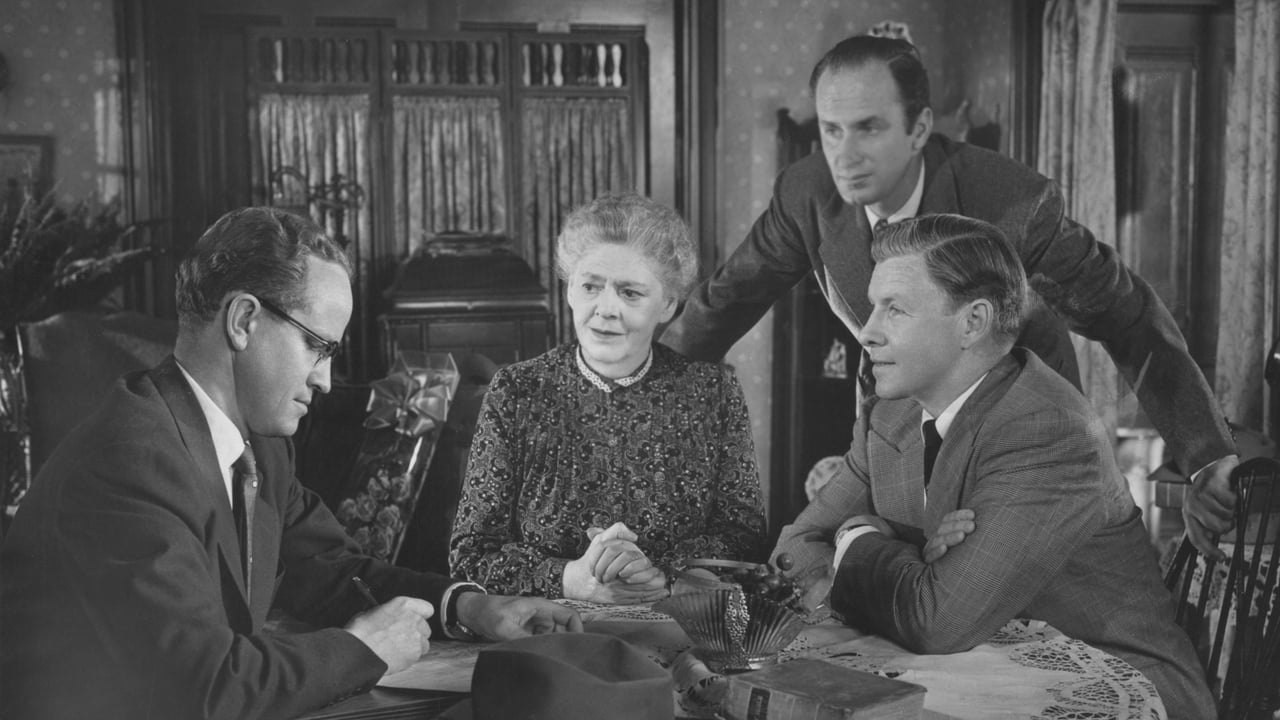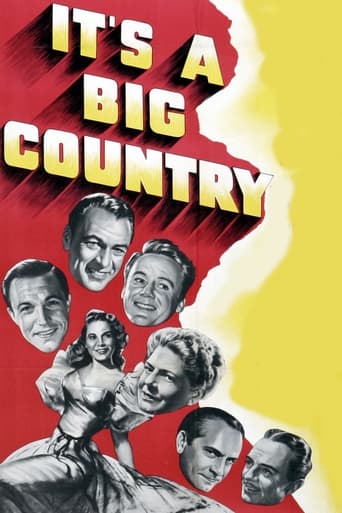Vashirdfel
Simply A Masterpiece
Scotty Burke
It is interesting even when nothing much happens, which is for most of its 3-hour running time. Read full review
Wyatt
There's no way I can possibly love it entirely but I just think its ridiculously bad, but enjoyable at the same time.
Kimball
Exactly the movie you think it is, but not the movie you want it to be.
jjnxn-1
Collection of stories to show the melting pot aspect of the USA. The film is blessed with an array of talent that only could be pulled together in Hollywood at its peak. Episodic by nature and all the vignettes have their charm but the first three are really the best.William Powell and James Whitmore breeze their way through a lively discussion of the ever evolving nature of the country. Their reactions to each other are what makes the skit.Next up is a little story about not being lost in the crowd made charming by Ethel Barrymore's gentle performance. The next segment is a tribute to notable African Americans which is nice in and of itself but that's also why it's a bit problematic. Considering the time it was made the isolated state of the short would have made it easy to snip out in the South. Of course the same could be said for any of the stories but since their are not people of color in any of the other segments it's rather obvious that was the intention at the time. Still it's a nice opportunity to see the significant Americans it spotlights.The other sections all showing various slices of life, aside from Gary Cooper's star bit simply representing Texas, are pleasant but are on the sticky side of sweet.
mountainkath
I wanted to like this film. I really did. But, I could not. The premise was a great idea, but it was poorly executed. The only reason I kept watching was because of the amazing superstar cast.My favorite stories were the first one with the gentlemen on the train discussing America and the Gary Cooper segment where he was talking about Texas. Both of these segments held my attention and I thought they were very well done. Sadly, this was not the case for the rest of the film.I enjoyed the Nancy Davis plot about the boy needing glasses, but it went on a bit too long and seemed to get quite bogged down. I'm a huge Gene Kelly fan and wanted to enjoy his segment more than I did. However, I couldn't help being totally distracted that he and Janet Leigh decided to marry after knowing each other just a few minutes. I know this is a common plot to classic movies, but it still distracted me. Another distraction was Kelly romancing a woman much younger than him but again...this was a common theme in classic movies (and Kelly movies).I enjoyed Ethel Barrymore's segment solely because of Barrymore. The plot was so thin and dragged on much too long.I'm glad I watched this movie (seeing so many stars over the course of just 90 minutes was a real treat), but I doubt I'll ever watch it again.
jehrsam
I saw this movie when it originally came out and I took more people to see it in at least two successive trips to the old Crawford Theater. It is touching and worthwhile and depicts an America that all should see. Ethel Barrymore gives one of the best performances of her career. The preacher to the President is another vignette that stands out. There are memorable performances by Gary Cooper, Van Johnson, Gene Kelly, and Marjorie Main. Each vignette is a memorable one and all touch your heartstrings and provoke thought. It would be nice if it were available on DVD or even tape. What a delightful anthology this is. I recommend this to all. It is a movie you will enjoy.
bkoganbing
I doubt if a film like It's A Big Country could be made in and about the America of post Vietnam and Watergate. A whole lot of the clichés presented here just aren't bought any more by large segments of the population. For whatever it's worth the film is a presentation of what we thought about ourselves in 1951.It's a film with several different segments, some serious some pretty funny about every day Americans in all walks of life, in all parts of the then 48 states.The two I liked best were those that ironically starred the two men who were not MGM contract players, Gary Cooper and Fredric March. Gary Cooper plays a Texas cowboy talking about his state and disillusioning us with a tongue in cheek delivery about the way Texans and Texas are perceived by the other 47 states. Of course Cooper's humor and the whole premise behind this segment was that Texas was our largest state in land mass. That ended in 1959 when Alaska became the 49th state, still it's the highlight of It's A Big Country.Fredric March plays an Italian American father who's opposed to his son, Bobby Hyatt, getting needed glasses even after teacher Nancy Davis tells him it's necessary. He's got some old world ideas that need a bit of adjustment. March plays the role with dignity never do you feel he's a caricature.Another episode that is nicely done involves Gene Kelly, Greek American boy falling for Janet Leigh, Hungarian American girl. They've got a problem though, her father played by Hollywood's number one Hungarian S.Z. Sakall. In the past 20 years we've seen a whole lot of stories about ancient ethnic hatreds coming out of Eastern Europe. Sakall is carrying some old grudges against Greeks though he really isn't sure why. Point being that here in America you're supposed to leave that all behind. That segment is still very much relevant.Could we make It's A Big Country today? Not at this time, maybe at some future point when we've reached a national consensus that despite all our problems, America's a pretty good place after all.

